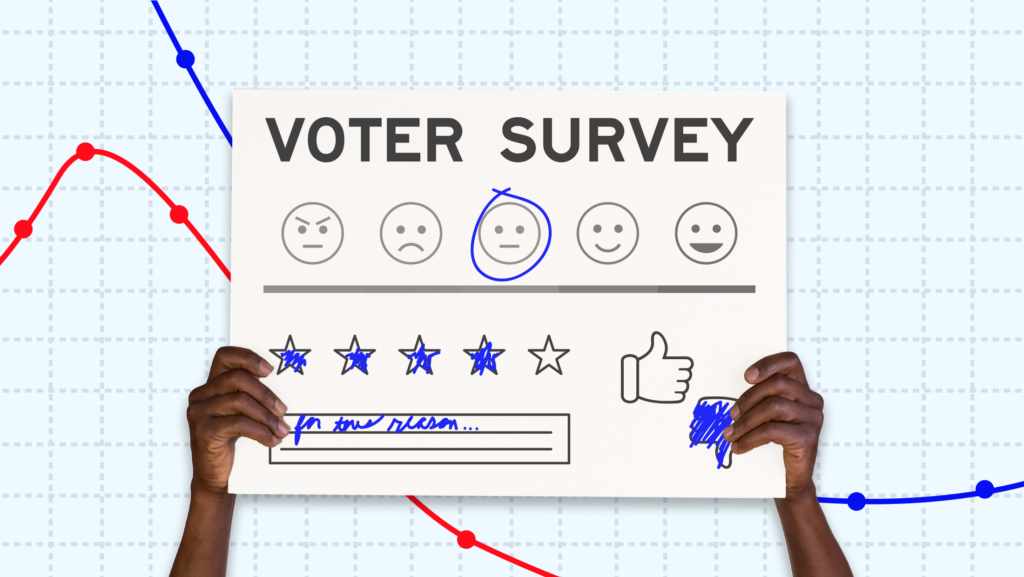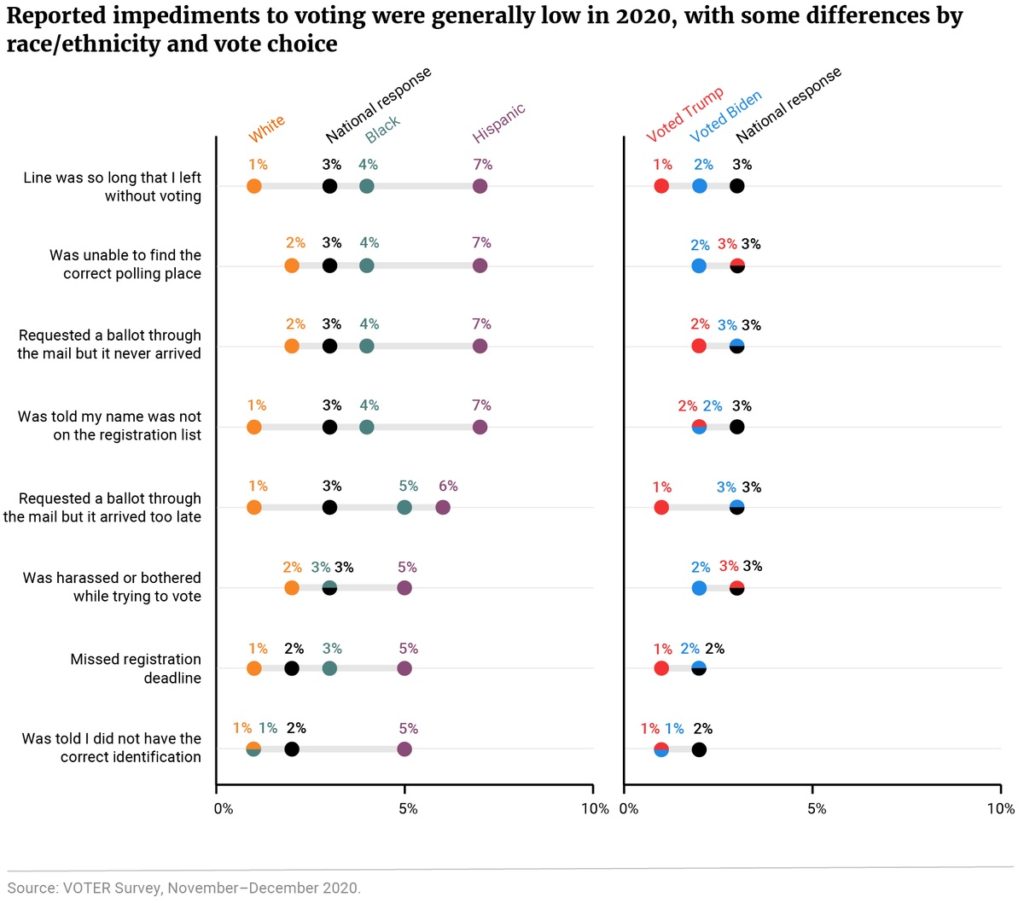Voter Confidence in the 2020 Election

This year, in an effort to pass voter suppression legislation and stir up distrust in our elections, Republicans have promoted bogus conspiracy theories about voter fraud and tried to challenge verified election results. Their proposals are ill intentioned and unconstitutional, but they are right about one thing: there are changes we can and should make to our elections. These reforms would ensure better participation and fairer outcomes.
In today’s Data Dive, we look at a new analysis from the Voter Study Group. “Voices on the Vote,” published in May 2021, takes a look back at voter confidence in the 2020 election and polled Americans about the barriers they faced at the ballot box. Overall, the study resulted in a major finding: While overall access to the ballot box for most Americans in 2020 was much easier than voters themselves expected, Black and Hispanic Americans are disproportionately subject to unfair and preventable barriers that make it harder to cast their ballots.
Here are the key takeaways:
1. Thanks to expanded voting methods, most voters found it easy to cast their ballots.
The media coverage in the summer before the election was dominated by the myriad of possible crises that could impede the election. From the pandemic, to foreign interference, to the underfunding of the U.S. Postal Service, to the understaffing of polling places, nearly half of voters (49%) expected voting to be “difficult” when polled in the summer of 2020. This stands in contrast to 15% of voters who anticipated difficulty voting polled in October 2018. Clearly, concerns about the election were incredibly high — but they were, for the most part, unnecessary. A Pew survey conducted after the election returned surprising results: 94% of voters said that casting their ballot had been very or somewhat easy.
This highly successful outcome is due in large part to the herculean efforts of poll workers and election administrators across the country who adapted to unprecedented circumstances to pull off a historic election. A large part of these adjustments was the expansion of voting methods — especially voting by mail, which a record-setting 45% of voters utilized in 2020. Another 25% voted early, meaning only 29% of voters cast their ballots at the polls on Election Day compared to 52% in 2016 — an eye-popping reduction that speaks to a widespread embrace of alternative voting methods. All in all, most voters felt voting was easy — and that is likely thanks to the widespread availability of early and mail-in voting. Many states are moving to make these pandemic-era vote method expansions permanent, and others should follow their lead.
2. Black and Hispanic voters were disproportionately impacted by voting impediments.
Although the aggregate data shows the vast majority of voters found it easy to cast their ballots, there are serious concerns of equity and accessibility among different demographics. The study looked at eight key impediments to voting and found that across almost all categories, Black and Hispanic voters encountered them at much higher rates. Overall, around 3% of voters experienced barriers that prevented them from voting. But among the majority of these barriers, including long lines, mail-in ballots arriving late or not at all and voter intimidation, Black and Hispanic voters were anywhere from 1-6% more likely to experience these impediments than white voters.

The important points here are clear: While the vast majority of voters reported a smooth and easy voting experience, those who did not were disproportionately voters of color. Barriers to voting compound one another, and each clearly has a discriminatory effect on who is able to have their voice heard. The 2020 election went much more smoothly than voters and administrators expected, but it was also incredibly close — and if Republican efforts to suppress votes prevent even a small number of voters from casting ballots, it can change the entire outcome of a swing state, or even a national election.
3. Voters were confident their own vote and those of their neighbors were counted accurately — but doubted the accuracy of votes in other parts of the country.
Finally, a revealing statistic in the study highlights the shortcomings of the GOP strategy to sow doubt about the election results in the minds of Americans. When asked whether they were confident that their votes were accurately counted, the number of Republicans who answered “yes” plummeted, with only 35% saying they were “very confident” compared to 75% in 2016.
However, more granular data reveals something different: Voters across the political spectrum were more confident that their own votes and those of their immediate geographic community were counted correctly than they were that votes “across the United States” were valid. 50% of Republicans were confident their vote was counted correctly, and 58% were sure that of their neighbors were, too. However, only 21% felt that votes from places across the country were accurately tallied. Republican voters felt their own votes and those of their family and friends were counted correctly, but distrusted the results in other states far from their own homes.
The authors of the study called this outcome “A polling truism: People are generally more positive about things closer to home than what is happening nationally.” It’s an interesting dynamic to consider as Republicans continue their all-out assault on voting rights, especially because their efforts have thus far have targeted state legislatures and local restrictions rather than national policy. Republican voters may buy the rhetoric of Republican politicians about voter fraud when it comes to states far from their own, but the majority believe that their own votes were counted correctly.
The vast majority of voters, no matter their beliefs on the state of the nation as a whole, feel that voting in their own backyard was easy, conducted accurately and reflected the will of the voters in their community. Republican legislatures will face an uphill battle convincing voters that their own neighborhoods are the source of rampant voter fraud and election rigging — but they will certainly keep trying.
However, we can enact vital reforms to expand voting access for thousands of Black and brown voters who are disproportionately excluded from the democratic process. Effective reforms may include ensuring that lines at polling places are not too long, expanding and improving our vote-by-mail system and fighting back against unnecessary and disenfranchising voter ID laws that Republicans continue to push across the country.
Although the administration of the 2020 election was a success in the face of unimaginable circumstances, there is a long way to go to ensure that ballot access is equitable and accessible for all voters in this country.